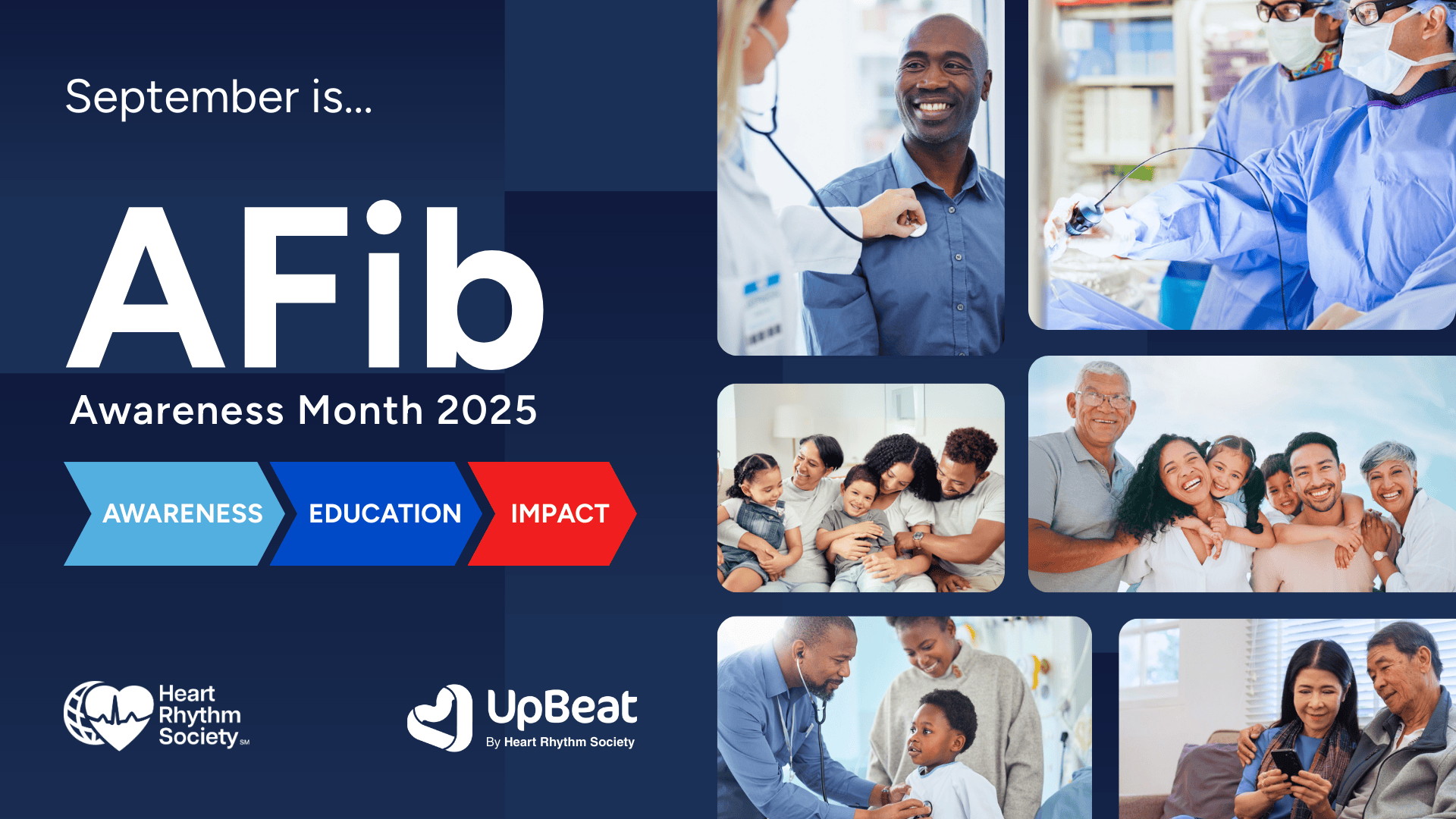
Raising Awareness. Improving Care. Changing Lives.
September is Atrial Fibrillation (AFib) Awareness Month — a time to shine a spotlight on the most common heart rhythm disorder, affecting millions worldwide.
AFib affects 1 in 4 adults over 40, yet many don’t know the symptoms or treatment options. Together, we can close the gap through education, prevention, and action.
For Patients & Families
Educate your patients about AFib with patient-friendly information, including the basics of AFib, signs and symptoms, diagnosis, treatment options, and lifestyle modifications.
Send your patients to UpBeat.org to download expert-developed patient information sheets and watch videos demystifying the diagnosis, treatment, and management of AFib.
Help your patients prepare for upcoming appointments and maximize their time with their care team with UpBeat's AFib Question Builder. With this innovative tool, patients can download a custom PDF of questions to ask their doctor (including pre-populated queries and options to add custom questions).
As part of the Heart Rhythm Society’s mission to advance patient care and public awareness of heart rhythm disorders, UpBeat TV is here to educate, empower, and connect the global heart arrhythmia community. From patients and caregivers to loved ones and healthcare professionals, we’re bringing expert insights, inspiring stories, and essential information about heart rhythm health and the vital role of cardiac electrophysiologists.
For Clinicians
The American College of Cardiology (ACC) and American Heart Association (AHA) released updated recommendations for preventing and managing atrial fibrillation. The new guideline was developed in collaboration with and endorsed by the American College of Clinical Pharmacy (ACCP) and the Heart Rhythm Society (HRS).
This comprehensive document updates the recommendations from the 2014 and 2019 guidelines on atrial fibrillation and includes new recommendations on atrial fibrillation and thromboembolic risk assessment, anticoagulation, left atrial appendage occlusion, atrial fibrillation catheter or surgical ablation, and risk factor modification and atrial fibrillation prevention.
Moderated by guideline authors. Topics include:
Managing stroke risk in specific populations often requires a tailored approach. The health care professional must weigh the risks and benefits of the different management strategies with each patient, and there are many “gray” areas for which no solid evidence base is available.
This complimentary case-based activity will address what to do when special situations arise and will examine the management of stroke risk in various patient populations in the context of surgery, acute coronary syndrome, AF ablation, and after a major bleeding event.
The learner can also participate in an 18-question self-assessment examination and can earn up to 2 ACE credits.
Supported by Sanofi and Biosense Webster, these three complimentary webinars each contain thoughtful presentations, recorded Q&As with a panel of experts, and full transcripts.
Topics Covered:
- Rhythm and rate control strategies in special populations
- Pharmacological and non-pharmacological interventions
- Catheter ablation as a first-line therapy
- Patient selection criteria and procedural techniques for catheter ablation
Topics Covered:
- Lifestyle modifications and their impact on AFib treatment
- Common co-morbidities associated with AFib
- Appropriate anticoagulation strategies
- Non-pharmacological therapies for stroke prevention
Sessions include:
- Hybrid epicardial-endocardial ablation for AFib with heart failure
- Pulsed field ablation: data and durability
- Patient selection & evidence-based algorithms
- Program development & collaboration models
- Episode 107: A Discussion of Catheter Ablation of AFib Patients with Cardiac Amyloidosis and Sarcoidosis: Procedural Outcomes and Findings LIVE from Heart Rhythm 2025
- Episode 102: A Discussion of Repeat Procedures after Pulsed Field Ablation for Atrial Fibrillation, the MANIFEST-REDO Study
- Episode 94: A Discussion of Atrial Fibrillation Nomenclature, definitions, and Mechanisms: Position paper from the International Working Group of the Signal Summit
- Exploring the Effects of Tirzepatide in AFib
- Policy Statement on Catheter Ablation of AFib
- Lessons from The OPTION Trial
- Global Voices on Atrial Fibrillation
(Don’t have time to watch? Listen as a podcast!)
CardiQ® showcases a quality improvement framework as well as best practice resources curated and shared by a community of expert clinicians. Start today to explore how CardiQ can help you transform care and outcomes for patients with heart rhythm disorders.
Latest Research & Innovation
TRANSFORM-AF found GLP-1 receptor agonists reduced AFib-related hospitalizations, cardioversions, and ablations.
DeePRISM model uses AI-driven analysis to improve outcomes in persistent AF ablation.
New standards outline five pillars: patient identification, evidence-based pathways, optimized procedures, outcomes reporting, and comprehensive education.
- Uncover the Brain-Heart Connection: Streamlining Workflows for Comprehensive AFib Care | Powered by viz.ai
- Pitch Competition at HRX Live 2025: New innovations in AFib care
Advocacy in Action
Heart Rhythm Advocates is the policy voice for the EP community — advancing fair reimbursement, expanding patient access, and protecting innovation in heart rhythm care.
CMS has proposed adding several cardiac ablation procedures — including AFib ablation (CPT 93653) — to the ASC Covered Procedures List for 2026.
- Could expand access and lower costs for patients
- Raises key issues around safety and reimbursement
- Submit comments by September 15, 2025
Browse All UpBeat Patient Information
Looking for trusted information for yourself or a loved one? Wherever you are on your heart health journey, UpBeat is here to help you and your family get on the right track with expert-developed patient education resources, including videos and downloadable patient information sheets.